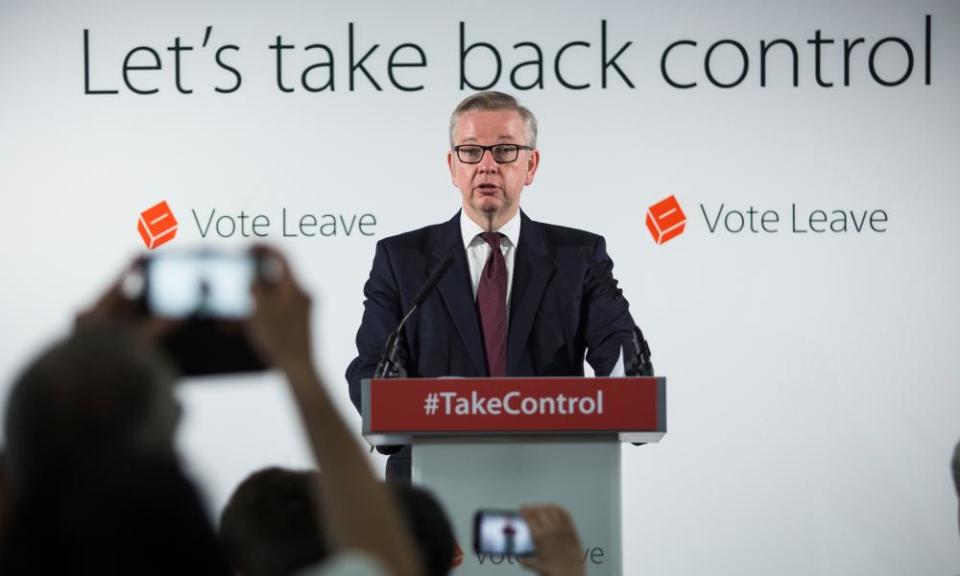Why the kid gloves for Trump, when it’s gloves off for the EU?

If leaving the EU was meant to be an exercise in self-belief, pride and patriotism, Donald Trump’s visit seems to have led some members of the political class to temporarily mislay these noble notions. The government that received him did not seem like a majestic keeper of the national flame, but a diminished, kowtowing embarrassment. It was a state visit of constant degradation. Trump came, he saw, and he humiliated the British political establishment.
An exercise in regaining sovereignty has ended up with Brexiters cowed before an incompetent president
Suddenly, the warriors puffing their chests out to the EU turned into pragmatic peacemakers in front of Trump. Theresa May was positively obsequious. This was no “bloody difficult woman”. When it comes to Trump and the importance of securing a trade deal with the US after leaving the EU, the logic is that we must be realistic and dispense with childish moral protests. This is business. When there is criticism of Trump, it is very carefully couched. After he retweeted Britain First, the then home secretary, Amber Rudd, conceded that it was wrong but warned the president’s critics to remember the “bigger picture” of the special relationship and intelligence-sharing. Last month, May somehow found it in herself to say the images of migrant children being kept in what look like cages were “deeply disturbing”, but that Trump’s visit to the UK should still go ahead to make sure “shared interests” could be discussed. In the same week, the former first secretary of state Damian Green agreed with May that it was appalling, but that “disrespecting” Trump and the office of the president was “not in our long-term national interests”.
However one feels about Trump, there is an argument to be made about how a calm approach towards the man puts the economic and security interests of the British citizen first, especially at a time when Brexit means that many eggs may have to be taken from the European continent and put into the single basket of the US. But this is the same party that has, for more than two years now, made being realistic not only deeply unfashionable, but traitorous.

The former foreign secretary Boris Johnson reportedly said “fuck business” when asked about executives’ Brexit fears. The government presides over a slow but certain haemorrhaging of jobs as corporate concerns are left unaddressed. Companies are either demanding more clarity on trade arrangements or have given up and already moved departments abroad.
But of course, with Brexit the purpose is simply to “take back control”, irrespective of whether it is ultimately beneficial to the country. That position has now soured into one in which any deal at all will be spun by hard Brexiters as a capitulation, any compromise as abject defeat. The EU must not only be left, it must be dictated to, and then vanquished. It is no longer about national interest, which is why we are in a state of profound national hypocrisy; one moment calling for calculated composure in the face of a mercurial sadist who has little incentive to move closer to an isolated Britain, and in the next hysterically severing ourselves from allies whose every action is perceived a slight.
The moral outrage and sense of wounded pride might be better directed at the US president, a man who can barely spend 24 hours on British soil without insulting the prime minister and the mayor of London, and offering inappropriate and meddlesome opinions on both internal politics and foreign affairs. The hard-headed pragmatism, in turn, should be applied to the clear and present benefits of staying close to the EU.
At the heart of this contradiction is a fixation on status. To Brexit supporters, EU members are bullying equals or uppity inferiors who need to be taught a lesson on British pluck. It passes such zealots by that as a unit these countries are much more formidable. The US, on the other hand, is a country that British governments have always been happy to subordinate themselves to in recognition of its economic and military supremacy. But that equation simply does not translate into one where closer ties with the US, even if the unreliable Trump does fill our begging bowl, mean the country can afford to alienate the EU. The government’s own analysis suggests that deals with the US and others would add no more than 0.6% to our GDP.
The Trump-May press conference was painful to watch, a stark illustration of the corner the country has been backed into. A seismic exercise in regaining sovereignty seems to have ended up in a place where Brexit’s executors must stand cowed while an incompetent, reckless president metes out insults and diktats. This was less peak diplomacy than the trough of desperation. Brexiters have demonstrated that they can be realistic, but seemingly not about the consequences of leaving the EU: that is a reality they do not want to confront.
• Nesrine Malik is a Guardian columnist

 Yahoo News
Yahoo News 
